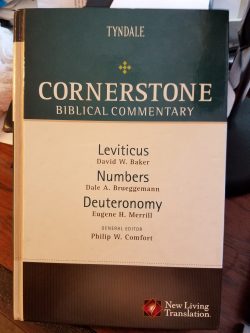Thoughts on Moving from Numbers to Deuteronomy
 I’ve completed the second chapter of Deuteronomy in the CBC commentary on Leviticus, Numbers, and Deuteronomy, and it may surprise some that I’ve felt a bit of a letdown as I moved from the variety of liturgy and laws, though interspersed with narrative, that is Numbers. It might surprise you less if you realize that my personal theology (and I think we all have one), is built on Ezekiel, Hebrews, and Leviticus, though not necessarily in that order. That’s the order in which I started studying the books seriously, however.
I’ve completed the second chapter of Deuteronomy in the CBC commentary on Leviticus, Numbers, and Deuteronomy, and it may surprise some that I’ve felt a bit of a letdown as I moved from the variety of liturgy and laws, though interspersed with narrative, that is Numbers. It might surprise you less if you realize that my personal theology (and I think we all have one), is built on Ezekiel, Hebrews, and Leviticus, though not necessarily in that order. That’s the order in which I started studying the books seriously, however.
For most Christian readers of Hebrew scripture, I think that getting into Deuteronomy is a bit of a relief. Reading Genesis through the first half of Exodus goes pretty smoothly, but then one bogs down on all those details of building the sanctuary, and you get them twice: instructions and implementation. Then when you’ve worked your way through that you get to Leviticus, which contains so much liturgy, along with obscure laws on issues we generally don’t face. Numbers is a little less dismal, and then Deuteronomy starts to give us propositional theology that we can get our teeth into.
I was there before I spent serious time in Leviticus. I don’t claim expertise; that takes incredible amounts of study. But I’ve spent a great deal of time on the text. There’s a great deal that one can learn from that liturgy, including the simple fact that liturgy matters. Those of us who are not “high church” tend to think that the way in which worship is conducted isn’t very important. It’s mostly a time to accomplish our goals, often divided between “worship” (when that’s defined as musical), and “sharing the Word,” and of course those who believe one or the other is critical can have some great debates.
But we can learn a great deal from the ancient liturgy, and I think we can either increase or diminish our impact on the world around us through constructive liturgy. This is not an argument for high church liturgy. I am also not arguing that worship only takes place in worship services, much less that worship can be equated to music. All our activities should be done in worship to our creator.
But there is a time for us to act out for ourselves and for others the nature of the church as a community, and coming together at a common place and at a common time to share in activities as a community is, I think a critical part of this. Unfortunately, we have a variety of ways to avoid this. We may reject gathering together entirely. It may be a time when an ordained pastor occupies most of the time explaining to us what he believes we should believe. It may be a time to experience an emotional high as part of musical or artistic endeavors. It may be a scripted program that is ancient and could be meaningful, but is carried out by rote.
But it doesn’t have to be any of those things. It can be, instead, a time when we gather together and join in activities that encourage one another and prepare us to face the world around us as effective witnesses for Jesus. I don’t think there’s a particular set of activities that make this happen. I do think it’s possible because I have seen and experienced it.
God doesn’t just communicate in one way. Hebrews 1:1-4 makes it clear, and presents Jesus as the ultimate communication from our creator (amongst other things that reinforce that idea). The Torah (or Pentateuch) presents these different ways. We have liturgy helping to teach the people and to shape them into God’s people. We have story, showing us people experiencing God’s activity in the world, and we have theological propositions. I kind of prefer the liturgy, but that’s just me. Here we have all three demonstrated.
I think that neglecting one or the other leaves us with potentially skewed views of God. We need both the God who is the same yesterday, today, and tomorrow (Hebrews 13:8), and the God who is sorry that He created humanity (Genesis 6:6). The same God also forgives a poor Israelite who can’t even afford a bird as a sin offering (Leviticus 5:11).
So I guess I won’t be let down and instead enjoy the change!
(For studying the Bible as story, try Ruth and Esther: Women of Agency and Adventure by Dr. Bruce Epperly.)

